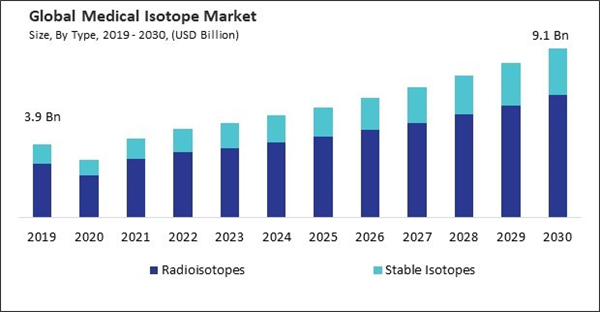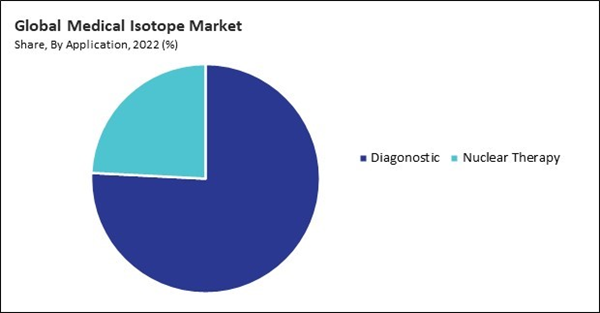The development of new therapeutic radiopharmaceuticals and expanded clinical indications for existing isotopes has led to a growing number of therapeutic procedures in nuclear medicine. Consequently, the nuclear therapy segment would generate approximately 24.2 % share of the market by 2030. Research and clinical trials continue to explore the efficacy and safety of isotopic therapies for a wide range of medical conditions, including bone metastases, neuroendocrine tumors, thyroid disorders, and hematological malignancies.
Nuclear medicine imaging technology advances have significantly improved image quality, resolution, and sensitivity. High-resolution imaging systems, such as PET/CT and SPECT/CT scanners, provide detailed anatomical and functional information, allowing healthcare professionals to visualize physiological processes at the molecular level with exceptional clarity. Therefore, advancements in nuclear medicine imaging techniques drive the market’s growth.
Additionally, Cancer and cardiovascular diseases often require comprehensive diagnostic evaluation to assess disease extent, stage, and progression. Medical isotopes, such as technetium-99m (Tc-99m) and fluorine-18 (F-18), are widely used in nuclear medicine imaging techniques such as PET and single-photon emission computed tomography (SPECT) to visualize physiological processes and identify disease-related abnormalities. Therefore, the rising cases of cancer and cardiovascular diseases are driving the growth of the market.
However, Many radioisotopes used in nuclear medicine imaging and therapy are produced in nuclear reactors, which require highly specialized infrastructure and regulatory oversight. Radioisotope availability depends on the operational status of nuclear reactors, which may be subject to maintenance shutdowns, regulatory inspections, and safety protocols. Hence, the limited availability of radioisotopes is hampering the market’s growth.
Furthermore, Restrictions on travel, lockdown measures, and reduced staffing at nuclear reactors and isotope production facilities led to delays and shortages in the availability of medical isotopes, impacting patient care and diagnostic procedures. During the peak of the pandemic, many non-essential medical procedures, including diagnostic imaging and nuclear medicine scans, were postponed, or canceled to prioritize resources for COVID-19 patients. Thus, the COVID-19 pandemic had a negative impact on the market.
By End User Analysis
Based on end user, the market is categorized into hospitals, diagnostic centers, and research institutes. The diagnostic centers segment witnessed a 28.92 % revenue share in the market in 2022. Diagnostic centers facilitate multidisciplinary collaboration among healthcare professionals, including radiologists, nuclear medicine physicians, oncologists, surgeons, and medical physicists. Diagnostic centers are hubs for collaboration and communication, fostering teamwork and care coordination across different specialties.By Application Analysis
Based on application, the market is bifurcated into diagnostic and nuclear therapy. The diagnostic segment attained the 75.79 % revenue share in the market in 2022. Diagnostic imaging plays a crucial role in the early detection and diagnosis of various medical conditions, including cancer, cardiovascular diseases, neurological disorders, and musculoskeletal injuries. Medical isotopes enable the development of highly sensitive and specific imaging techniques that facilitate the early detection of abnormalities and disease processes at the cellular and molecular levels.By Type Analysis
On the basis of type, the market is segmented into stable isotopes and radioisotopes. The radioisotopes segment recorded the 73.57 % revenue share in the market in 2022. Radioisotopes, drugs, or compounds labeled with radioactive isotopes for diagnostic purposes are essential for radiopharmaceuticals. Radioisotopes such as technetium-99m (Tc-99m), gallium-68 (Ga-68), and copper-64 (Cu-64) are commonly incorporated into radiopharmaceutical formulations for clinical use. Hence, higher demand for radiopharmaceuticals is driving the growth of the segment.By Regional Analysis
Region-wise, the market is analyzed across North America, Europe, Asia Pacific, and LAMEA. In 2022, the Asia Pacific region generated a 26.87 % revenue share in the market. The Asia Pacific region is experiencing a rise in the incidence of chronic diseases such as cancer, cardiovascular disorders, and neurological conditions. As the burden of disease increases, there is a greater need for early detection, accurate diagnosis, and effective treatment options, driving demand for diagnostic imaging studies and therapeutic interventions using medical isotopes.Recent Strategies Deployed in the Market
- Feb-2024: Bayer AG has entered into an agreement with PanTera, a Belgian Joint Venture established by IBA and SCK CEN. As per the agreement, PanTera will provide actinium-225 to Bayer, allowing Bayer to continue its clinical trials.
- Jan-2024: ITM Isotope Technologies Munich SE has entered into a supply agreement with Alpha-9 Oncology, Inc., a clinical-stage biotechnology company focused on developing unique radiopharmaceuticals. As per the agreement, ITM will provide its medical radioisotopes, specifically non-carrier-added Lutetium-177 (n.c.a.177LU), to support Alpha-9's development of Lutetium-based candidates for radiopharmaceutical therapy aimed at treating cancer. This collaboration contributes to the advancement of Alpha-9's pipeline candidate for cancer treatment through the utilization of ITM's radioisotope technology.
- Oct-2023: Canadian Nuclear Laboratories (CNL) has established a joint venture with ITM Isotope Technologies Munich SE, a prominent radiopharmaceutical biotech company, under the name Actineer Inc. The objective of this new venture is to expand the industrial production capacity of actinium-225 and address the global demand for this highly sought-after radioisotope, which remains underserved in terms of manufacturing and production capabilities.
- Feb-2023: Canadian Nuclear Laboratories (CNL) has collaborated with Jubilant Radiopharma, a global leader in radiopharmaceuticals, to collaborate on the advancement of innovative alpha radiopharmaceuticals. This collaboration aims to jointly develop groundbreaking radiopharmaceutical therapies. Operating under CNL’s Canadian Nuclear Research Initiative - Health (CNRI-H) program, this joint program represents a significant step in CNL's broader initiative to foster the exploration and creation of new, life-saving radiopharmaceutical treatments. This includes the exploration of targeted alpha therapy and novel cancer treatments utilizing Actinium-225, a medical isotope manufactured by CNL.
- Nov-2022: Eczacibasi-Monrol has entered into a partnership with FutureChem Co., Ltd., a South Korea-based company specializing in the development and distribution of radiopharmaceuticals. Under this agreement, Eczacibasi-Monrol will supply the radioisotope Lu-177 n.c.a. (Lutetium-177 non-carrier-added) to support FutureChem's Investigational New Drug (IND)-enabling Phase 2 clinical trial with Ludotadipep, 177Lu-FC705.
List of Key Companies Profiled
- Mallinckrodt PLC
- Bayer AG
- GE HealthCare Technologies, Inc.
- Canadian Nuclear Laboratories (Atomic Energy Of Canada Limited)
- ITM Isotope Technologies Munich SE
- Siemens Healthineers AG
- Eczacibasi-Monrol
- NorthStar Medical Radioisotopes, LLC
- Nordion Inc. (Sotera Health LLC)
- Iba SA
Market Report Segmentation
By Type- Radioisotopes
- Stable Isotopes
- Hospitals
- Diagnostic Centers
- Research Institutes
- Diagnostic
- Nuclear Therapy
- North America
- US
- Canada
- Mexico
- Rest of North America
- Europe
- Germany
- UK
- France
- Russia
- Spain
- Italy
- Rest of Europe
- Asia Pacific
- China
- Japan
- India
- South Korea
- Singapore
- Malaysia
- Rest of Asia Pacific
- LAMEA
- Brazil
- Argentina
- UAE
- Saudi Arabia
- South Africa
- Nigeria
- Rest of LAMEA
Table of Contents
Companies Mentioned
- Mallinckrodt PLC
- Bayer AG
- GE HealthCare Technologies, Inc.
- Canadian Nuclear Laboratories (Atomic Energy Of Canada Limited)
- ITM Isotope Technologies Munich SE
- Siemens Healthineers AG
- Eczacibasi-Monrol
- NorthStar Medical Radioisotopes, LLC
- Nordion Inc. (Sotera Health LLC)
- Iba SA










